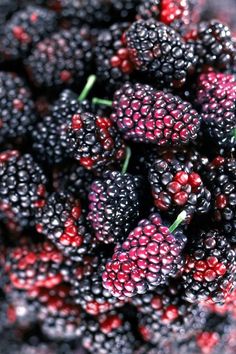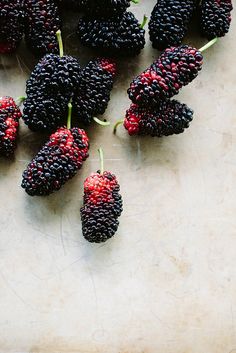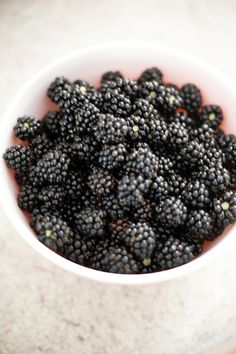Blackberry Vs. Mulberry: Whats the Difference?

Fruits are now an essential component of many recipes. Berries such as mulberry and blackberry are among the most frequent.
Many individuals, however, confuse mulberry for blackberry and vice versa. Given their similar appearance and taste, it’s almost unavoidable!
However, there are several distinctions between mulberry and blackberry.
The most frequent difference is that mulberry grows on trees, whereas blackberry grows on bushes. Furthermore, as compared to mulberry, blackberry has a slightly earthy flavor.
Continue reading to learn more about the fundamental distinctions between mulberry and blackberry.
What is Mulberry?

Mulberry isn’t a particularly prevalent fruit in the United States; it’s more common on the Asian subcontinent.
It is, nonetheless, a highly popular fruit in Asia. In actuality, it is not a berry at all. It is a form of communal or numerous fruit. So, rather than producing a single fruit, several blossoms merge to make a mulberry.
Mulberries go nicely with fruit salads, bread items, and even acai bowls if you’re into healthy cuisine.
What is Blackberry?

On the other hand, Blackberries are relatively abundant in the United States since they are primarily grown in North America and the neighboring regions.
As a result, you can readily find both fresh and frozen blackberries.
Blackberries, like mulberries, are not berries. They are, in fact, collective fruits. One blackberry is produced by the carpels of a single flower in this type.
Blackberries are used to produce a variety of delectable dishes and goods, including jams, juices, bakery items, fruit salad, and many more.
Are Blackberry and Mulberry the same?
No, blackberries and mulberries are not the same.
Furthermore, numerous recipes call for berries like blackberry and mulberry. So, if you’re not sure what the distinctions are and how they affect your food, keep reading to learn more.
Region
One of the most significant distinctions between blackberry and mulberry is where they are grown.
- North America and Europe are the only places where you can get blackberries.
- Mulberries, on the other hand, are indigenous to Asian countries. As a result, they are hardly accessible in the United States, and even if they are, they are significantly more expensive.
Growth
- Aside from geography, there is one distinction that you may not be aware of. Mulberries grow on trees, whereas blackberries grow on bushes.
- Thorny plants produce blackberries. These shrubs have canes that spread across the ground. The canes, however, develop more erect and yield blackberries after a few months.
- They continue to grow roots and give rise to new blackberry bushes. As a result, a group of such blackberry bushes is brambled.
- On the other hand, Mulberries are one of the most difficult berries to cultivate on trees. They often grow on medium to large-sized trees, mainly in Asia and the African subcontinent.
- Most mulberry trees are now pruned to allow for simple berry gathering. They are incredibly popular, but they are also illegal in many regions.
- There are also unproductive mulberry tree kinds, which are required for silkworm feeding. It’s not because of the mulberries but because these trees produce an abundance of pollen. These pollens can have an impact on the air quality of any place.
Taste and smell
- Mulberry and blackberry flavor and aroma may influence any meal you’re cooking. Mulberries and blackberries both have a sweet and tangy flavor.
- However, there is a slight variation in their overall tastes.
- When you first taste blackberries, they have a tangy flavor. Later on, they become quite sweet and juicy. Aside from that, blackberries have earthy tones that mulberries do not have.
- Mulberries, on the other hand, are one of the sweetest berries. They’re both sweet and tart, but their flavor is softer than blackberry, so keep that in mind while you’re cooking.
- The aroma of blackberries and mulberries is delicious. However, the aroma of blackberries is musky and flowery. On the other hand, Mulberries have a scent that is in between grapes and blackberries.
Appearance
- From a distance, mulberry and blackberry will appear very similar. However, when you examine them closely, the distinctions become more apparent.
- Blackberries, for example, have a spherical form.
- They’re around ½ to 1 inch in diameter and 1 inch in length. These berries are often dark purple or nearly black in hue.
- Mulberries, on the other hand, have an oval form. They’re also a little longer than blackberries. The hue of these berries ranges from dark red to dark purple.
- Mulberries, unlike blackberries, may stain your hands when eaten or used.
Food application
- Because of their similar taste, mulberries and blackberries have comparable dietary uses. You may use them in various pastry items, fruit salads, jams, acai bowls, cereals, and a variety of other dishes. You have a choice!
- On the other hand, Mulberries have a more delicate and softer flavor. As a result, they match nicely with others rather than being a stand-alone fruit.
- If you’re making anything using mulberries, you might need to add a few more ingredients to bring out the tastes.
- On the other hand, Blackberries are delicious and frequently do not require any additional additives to bring out the flavor.
Health benefits

- Mulberries and blackberries are packed with health advantages.
- They are high in nutrients that will benefit you in the long run. Blackberries, for example, are high in vitamins A and E. They also contain a lot of fiber.
- Mulberries are more nutritious than blackberries. They have a high concentration of vitamins, calcium, potassium, and carbohydrates. They are also used to improve blood sugar management in diabetics.
Can You Substitute Blackberries for Mulberries?
Mulberries, as previously said, are not as common in the United States as blackberries. So, if the recipe calls for them, don’t be concerned! You may easily swap blackberries for mulberries in tarts, cheesecakes, muffins, fruit salads, and other baked goods despite the differences. The flavor is virtually identical.
Conclusion
Mulberries and blackberries are the most delicious and nutritious berries. They’re the potato of the fruit kingdom since they go with virtually anything! They can lend their taste to bread items or preserves.











